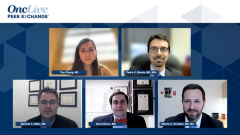
Impact of Adjuvant Therapy on Treatment Selection in Advanced RCC
David Braun, MD, touches on how the choice of adjuvant therapy can impact subsequent treatment selection in advanced RCC.
Episodes in this series

Tian Zhang, MD: Dr Braun, how has the use of adjuvant therapy has impacted our treatment decisions and subsequent therapy, specifically patients progressing after adjuvant pembrolizumab?
David Braun, MD, PhD: That’s a great question. Truthfully, it’s a difficult question. I don’t think we know the answer. There are some general principles we can think about, but for someone who’s progressed on adjuvant pembrolizumab, we don’t have the data to know the next best thing to do. I’ve talked to a lot of colleagues, and some are invoking the platinum paradigm: platinum sensitivity, platinum resistance, or platinum refractory depending on when the progression occurs. I’m not sure biologically it has the same linkage between immunotherapy and cytotoxic chemotherapy, but in the absence of a better paradigm, that’s a very reasonable approach.
[There are a couple of] factors I’d take into account. One, when did the progression occur? Is this someone who’s actively getting pembrolizumab and the progression occurs while getting therapy? That’s a very different story from someone who got adjuvant pembrolizumab and then has progression 5 years later. Those are very different stories that would factor differently in my mind of how I think of them as sensitive or resistant to anti–PD-1 based therapy. Obviously, there’s a whole spectrum in between. The second part is, how rapid is the progression? Is this a situation with a relatively modest amount of progression? It’s found radiographically but not symptomatically. Or is this a symptomatic progression? There’s an impending, visceral crisis, where you need to maximize a response. That might guide you to think about combination therapies as opposed to single agent.
Another important patient-specific factor is, how did the patient tolerate immunotherapy? How did the patient tolerate pembrolizumab? Was it a relatively easy course of treatment? Are there a lot of immune-related adverse events? Some of them are substantial. That might help us think about how much we push more immunotherapy and in what setting. Those are the general principles I would use, and I don’t think there’s a perfect answer. My thought process for today... is that if someone had that progression on pembrolizumab—it was in that 1-year period of treatment and progressed—I’d be more inclined to switch to TKI [tyrosine kinase inhibitor]–based therapy, considering more progression on the equivalent of a first-line anti–PD-1 monotherapy.
For patients who are the opposite—they’ve had treatment with pembrolizumab, and years later they’ve recurred—I’m more inclined to treat them similar to how I would treat a naïve patient. I’d be more inclined to use an up-front immunotherapy-based combination. For those in between, that’s where the patient factors come in. Is this something that needs rapid progression, so I need to throw everything I can at it to try to maximize the chances of response? Is this a slow progression, for which I might think about a combination of I/O [immuno-oncology]–based therapies to get the possibility of a durable response? We’ve seen that with something like nivolumab-ipilimumab. That’s where those 3 factors—the timing of progression, the rapidity of progression, and the tolerance of prior therapy—will play a role.
Tian Zhang, MD: Perfect. It’s comprehensive in terms of thinking about toxicities, timing of progression, and mechanisms. That was a wonderful discussion. Thank you so much.
This transcript has been edited for clarity.



































